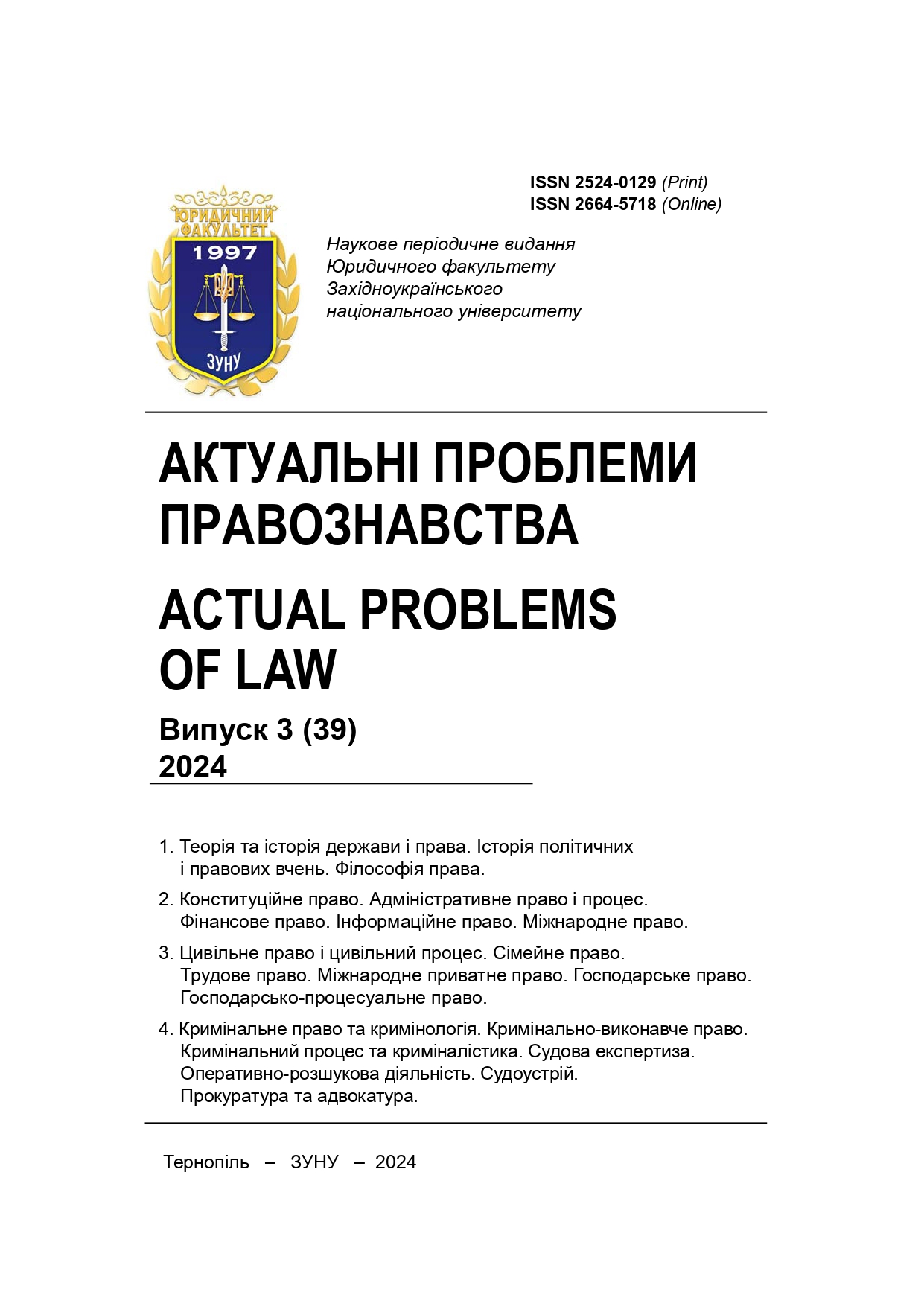European standards for the functioning of places of detention and their significance for Ukraine
DOI:
https://doi.org/10.35774/app2024.03.098Keywords:
places of deprivation of liberty, violation of the rights of convicts, prisoners, standards, European continentAbstract
This article analyzes and studies the issue of European standards for the functioning of places of detention, as well as their impact on Ukrainian realities in the field of protection of the rights of persons held in such places. It is proved that the development of democratic institutions, strengthening of human rights, and combating violations in the penitentiary system require the study and implementation of European standards. It is emphasized that after the Revolution of Dignity in 2014, Ukraine began reforming the penitentiary system. However, many problems remain relevant, including, in particular, overpopulation of penitentiary institutions; outdated infrastructure that does not meet modern requirements; underfunding and low staff remuneration; insufficient attention to the psychological and social rehabilitation of convicts. When studying the issue of standards in the field of functioning of places of detention, we believe that they are formed by the following three mechanisms: first, international standards for the treatment of convicts and prisoners, usually called “international penitentiary standards”. Secondly, case law plays an important role, in particular the decisions of the European Court of Human Rights (ECHR). Thirdly, it is worth noting the monitoring activities carried out through the reports of the European Committee for the Prevention of Torture and Inhuman or Degrading Treatment or Punishment. After analyzing each of these elements, it was concluded that European standards, such as the European Convention on Human Rights, the Council of Europe's Recommendations on Prison Conditions and Re-socialization, the case law of the European Court of Human Rights, and the case law of the European Committee for the Prevention of Torture and Inhuman or Degrading Treatment or Punishment, are the basis for improving the system of places of detention. Ukraine, as a signatory to numerous international agreements, is obliged to implement them in national legislation and practice.
References
Vikipediia [wikipedia]. https://uk.wikipedia.org/wiki/%D0%A1%D1%82%D0%B0%D0%BD%D0%B4%D0%B0%D1%80%D1%82. Retrieved from https://uk.wikipedia.org/wiki/ [in Ukrainian].
Zakon Ukrainy «Pro standartyzatsiiu» (2014) [The Law of Ukraine “On Standardization”]. Vidomosti Verkhovnoi Rady - Bulletins of the Verkhovna Rada, 31, p. 1058 [in Ukrainian].
Denysov S.F. & Zaika D.Ie. (2021) Mizhnarodno-pravovi standarty shchodo vypravlennia ta resotsializatsii zasudzhenykh [International legal standards for the correction and re-socialization of convicts]. Visnyk penitentsiarnoi asotsiatsii Ukrainy - Bulletin of the Penitentiary Association of Ukraine, 1 (15), 49-66 [in Ukrainian].
Rabinovych P. M. (2016) Mizhnarodni standarty prav liudyny: vlastyvosti, zahalne poniattia, klasyfikatsiia [International human rights standards: properties, general concept, classification]. Visnyk Natsionalnoi akademii pravovykh nauk Ukrainy - Bulletin of the National Academy of Legal Sciences of Ukraine, 1 (84), 19-29 [in Ukrainian].
Kolodchyn D.V. (2023) Rol mizhnarodno-pravovykh standartiv u zapobihanni zlochynnosti v penitentsiarnii sferi zarubizhnykh krain [The Role of International Legal Standards in Preventing Crime in the Penitentiary Sphere of Foreign Countries]. Aktualni problemy yurydychnoi nauky. Pravova pozytsiia - Current issues of legal science. Legal position, 4 (41), 140-144 [in Ukrainian].
Rekomendatsiia N R (92) 16 Komitetu ministriv derzhavam-chlenam pro Yevropeiski pravyla shchodo zahalnykh sanktsii ta zakhodiv Rada Yevropy [Recommendation N R (92) 16 of the Committee of Ministers to the Member States on the European Regulation on Common Sanctions and Council of Europe Measures]. https://zakon.rada.gov.ua/laws/show/995_907. Retrieved from https://zakon.rada.gov.ua [in Ukrainian].
Komitet ministriv derzhavam-chlenam stosovno perepovnenosti viaznyts i zrostannia kilkosti uviaznenykh № (99) 22 [Committee of Ministers to Member States on prison overcrowding and the growing number of prisoners No. (99) 22]. https://rm.coe.int/16806f407b. Retrieved from https://rm.coe.int [in English].
Krasnokutskyi O. V. (2019) Mizhnarodno-pravovi mekhanizmy zabezpechennia prav zasudzhenykh do pozbavlennia voli [International legal mechanisms for ensuring the rights of persons sentenced to imprisonment]. Kharkiv, 201 [in Ukrainian].
Sprava "Kaverzin proty Ukrainy" [The case of Kaverzin v. Ukraine]. https://ips.ligazakon.net/document/SOO00420. Retrieved from https://ips.ligazakon.net [in Ukrainian].
Sprava «Khailo proty Ukrainy» [The case of Hailo v. Ukraine]. https://zakon.rada.gov.ua/laws/show/974_439. Retrieved from https://zakon.rada.gov.ua [in Ukrainian].
Sprava «Petukhov proty Ukrainy (№ 2)» [Case “Petukhov v. Ukraine (No. 2)”]. https://zakon.rada.gov.ua/laws/show/974_d98#Text. Retrieved from https://zakon.rada.gov.ua [in Ukrainian].
Sprava «Nevmerzhytskyi proty Ukrainy» [The case of Nevmerzhytskyi v. Ukraine]. https://ips.ligazakon.net/document/SO1153. Retrieved from https://ips.ligazakon.net [in Ukrainian].
Sprava «Merit proty Ukrainy» [The case of Merit v. Ukraine]. https://zakon.rada.gov.ua/laws/show/980_214#Text. Retrieved from https://zakon.rada.gov.ua [in Ukrainian].
Yevropeiska konventsiia pro zapobihannia katuvanniam chy neliudskomu abo takomu, shcho prynyzhuie hidnist, povodzhenniu chy pokaranniu (1987) [European Convention for the Prevention of Torture and Inhuman or Degrading Treatment or Punishment]. https://zakon.rada.gov.ua/laws/show/995_068#Text. Retrieved from https://zakon.rada.gov.ua [in Ukrainian].





